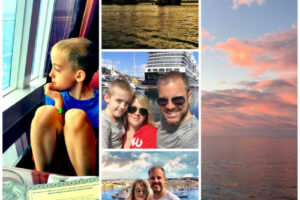Avoiding Health and Beauty Travel Mishaps
The world is opening its borders again as most of the population is vaccinated. As a result, travelers can find it easier to book a holiday abroad without worrying about last-minute COVID cancelation. While it doesn’t mean that risks are non-existent, we can safely say that we have reached a point where the global pandemic has become less of an obstacle for travelers.
However, for many of us, booking a trip is likely to disturb the established everyday routine. As we all know, our body can react negatively to sudden changes in routine, such as the time of sleep or when you eat. Therefore, if you are planning a vacation abroad this year, you may want to pack some essentials to preserve your health and beauty during the trip. Here is our list of the top 10 tips to avoid beauty mishaps.

#1. Long haul flights and digestion
Long distance travel is exciting. It is a complete change of horizon and environment. However, you will need to spend several hours in a seat. Sitting for a prolonged duration can have dramatic health consequences. For a start, you could become prone to blood clots and sore limbs. Therefore, if you are about to book tickets for a long haul trip, you may want to make sure you know some exercises to get your blood moving regularly. Experienced flyers also recommend wearing compression socks or tights to get the blood flowing through the body and avoid clotting risks.
However, what you may not realize is the impact flying has on your stomach. Indeed, the intestines rely on blood circulation as part of the digestive process. Unfortunately, sitting idle on a plane can slow down blood flow to the stomach area and affect your digestion. It is not uncommon to experience constipation or stomach ache after a long haul flight. You should make a point of drinking plenty of water to help the digestive process and standing up and walking regularly.
#2. Long haul flights and dry skin
The air in the plane can affect your skin. Airplane cabins have a very low humidity content, less than 20%. In other words, dehydration is unavoidable on a plane. However, you can protect your skin to avoid dryness and inflammation.
When you are on board, experts recommend drinking plenty of water. It can be helpful as well to pack a moisturizer or a hydrating face mask to apply onboard.
When you arrive at your destination, take the time to look after your skin with a 4 step recovery technique:
- Mild exfoliation to remove dry skin cells
- Hydrating mask
- Bring some blood to your skin by handing upside down for a few minutes (seriously)
- Stick to known products

#3. Recover hair damage from plane and sun
Traveling abroad means exposing yourself to not only airplane cabin air but also a new environment and climate. So, it is a good idea to pack shampoos that can work hard to rescue your hair crisis.
For blonde hair, the main risk is to develop brassy tones with the combined sun and dryness. Using a purple shampoo will help regain your healthy blonde glow.
Brunettes can find their hair feeling mousy and shineless, which is where a blue shampoo can work wonders to tone their natural or dyed brown pigments.
Platinum or white hair will need a silver shampoo to neutralize unpleasant brassiness.
#4. Stop acne outbreak right now
Why do acne outbreaks tend to happen more frequently when you are traveling? The answer is: Because you are going through a lot during a trip. Essentially, naturally oily skin tends to compensate for air cabin dryness through excess sebum production. Excessive sebum is the number one enemy of healthy skin. Therefore, it is essential to exfoliate after landing so you can make sure your pores are not clogged up.
Similarly, if you tend to use sunscreen protection only on holiday, you may find it hard to keep your pores clear and clean. The typical vacation sunscreen lotion can clog pores and leave unpleasant residues. Instead, focus on light sunscreen with high SPF for your skin type.
#5. Tired and haggard look
A long distance flight typically means that you are changing timezones. As a result, you may find it difficult to adjust to the local time. Jet lag does affect both your physical health and your appearance. But there are a few tips you can follow to make things more manageable:
- Gradually adjust your schedule before you leave so you are less likely to be sleep-deprived.
- Regulate natural sunlight exposure when you arrive so your body can adjust the circadian rhythms more easily.
- Keep yourself hydrated as dehydrating make jet lag symptoms worse.
- Sleep on the plane if you are going to arrive at nighttime.
#6. Sugar rush, mood swings, and sleep patterns
Tiredness after a long flight is likely to decrease over a few days as your body adjusts to the new timezone. However, tiredness can make you more vulnerable to sugar cravings. The body craves sugar as a direct and immediate source of energy, and it is essential to resist the urge to indulge in sugary treats. Indeed, too much sugar can lead to mood swings and disturbs your sleep patterns. As sleep disruption is a natural consequence of travel, the last thing you want is to make it worse. Both mood swings and sleep disruption are likely to increase sugar cravings, creating a vicious circle.

#7. Nausea during traveling
Nausea is an unpleasant sensation that can affect your travel experience. It is important to understand that nausea can be caused by a variety of factors, including:
- Food poisoning
- Exposure to stuffy environments
- Motion sickness (on a plane, boat, etc.)
- Blocked intestines (after remaining in a sitting position for a long time)
If you are prone to motion sickness, you may want to pack medications. Hydrating regularly, standing up, and walking on the plane will prevent intestine issues.
#8. Mild cold or infection
Flying exposes your body to a lot of pressure, and therefore, it is expected to feel tired and a little weak upon arrival. However, if you are flying long distance, you want to make sure your body can recover quickly. Otherwise, the flight could affect your immune system and make you more vulnerable to diseases and infections.
Some of the best advice for travelers include:
- Hydrating while flying
- Maintaining an active lifestyle before traveling so your immune system is stronger
- Ensuring your choose nutritious food options during your trip
- Taking it easy during the first days as the body needs rest to recover
#9. Dry eyes
As mentioned, the air cabin is drying. For contact lens wearers, it is best to switch to glasses for the duration of the flight. The air dryness can make the contact lenses uncomfortable and lead to eye redness.
You also need to replenish your moisture level, and drinking plenty of water is a no-brainer. However, people prone to dry eye syndrome can also benefit from using an eye spray or eye drop to keep their eyes moisturized and fresh.
#10. Feeling cold when you arrive
As mentioned, flying takes a toll on the body. The combination of tiredness, air pressure, and the new timezone can temporarily drop the body temperature. The effect is temporary. But to prevent discomfort or further putting your immune system at risk, it’s a good idea to pack warmer clothes for your arrival.
Your body will adjust naturally with sunlight exposure to regulate the circadian rhythms.
If you have not been traveling a lot during the pandemic, it is fair to say that your body may not be used to these issues anymore. No panic! With these few tips, you’re likely to keep on top of minor health discomfort and beauty issues in no time!






